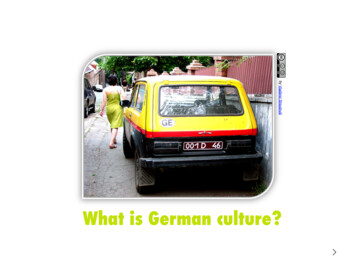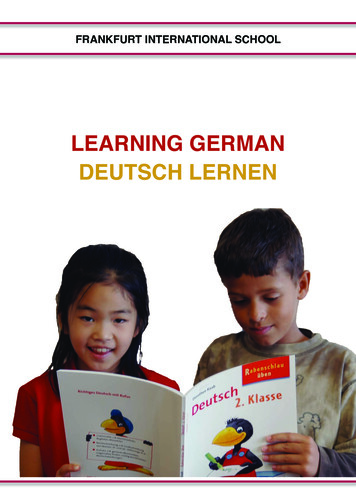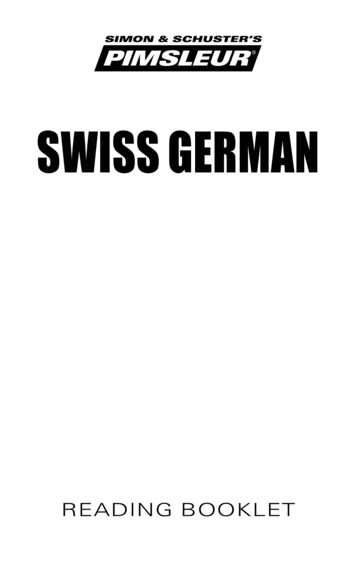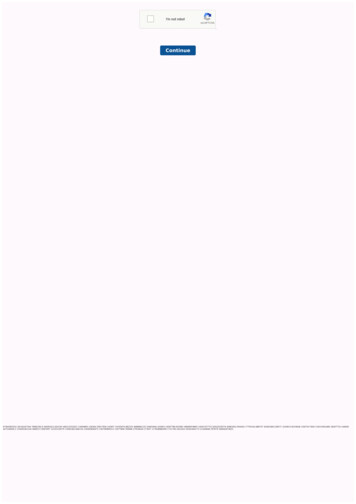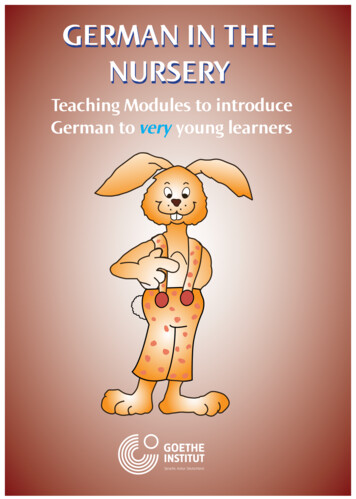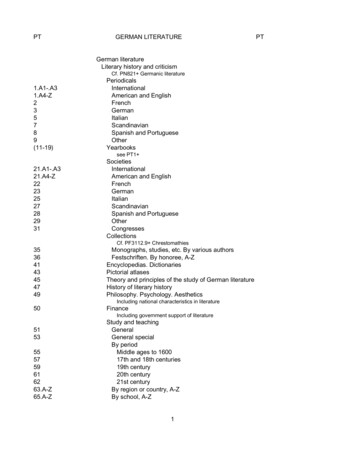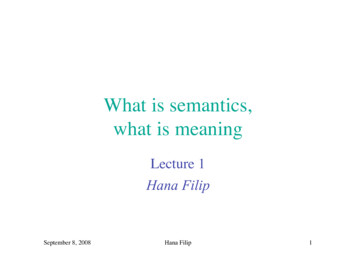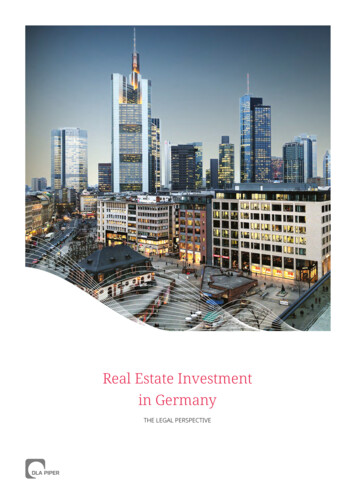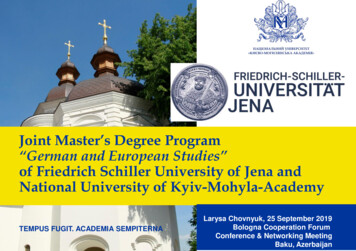
Transcription
Joint Master’s Degree Program“German and European Studies”of Friedrich Schiller University of Jena andNational University of Kyiv-Mohyla-AcademyTEMPUS FUGIT. ACADEMIA SEMPITERNALarysa Chovnyuk, 25 September 2019Bologna Cooperation ForumConference & Networking MeetingBaku, Azerbaijan
NaUKMA in a glance Basic Facts about NaUKMA:- established – 1615 (400 years old)- reestablished – 1991 (25 years old)- comprehensive (classical) state funded university (National, Researchstatus)- 4000 students (Bachelor, Master, PhD programs), highly competitiveadmission- 6 Faculties (Humanities, Social Sciences and Social Technologies,Economics, Law, Computer Sciences, Natural Sciences)2
What is different at / around NaUKMA:- multiple educational novelties in Ukraine – first at NaUKMA!- student-centered approach- pro-active educational and critical thinking discourse- “close distances”- corruption is not possible a priori!- academic integrity / fight to plagiarism!3
3
HISTORY GES was founded in 2006 as a cooperation project of NaUKMA and FSUJena, funded by the German Academic Exchange Service via its metaprogram “German-speaking study programs” GES started out as a 2-year double diploma program without anintegrated curriculum; students had to fulfill all obligations of NaUKMA’sMaster in Political Science and FSU’s Master of Politics (beyond 120credits; 2 master theses) From the very beginning the program included activities beyond the MAsuch as study trips for NaUKMA BA students, conferences and exchange ofscientific personnel Until the its major reform in 2019 the GES produced over 100 alumni whoare working mostly in international organizations, Ukrainian andinternational NGO sphere, in multinational corporations or research andjournalism (much less than expected in state service)2
Structures/Resources On both FSU Jena and NaUKMA sides a professor of theDepartment of Political Science heads the program; FSU Jena sendGerman coordinator to NaUKMA who works together with acoordinator from the Ukrainian side; teaching is ensured by alecturer and a DAAD language assistant sent to NaUKMA directlyby the DAAD; FSU Jena employs additional staff to take care of thescholarship holders Program has an own office in NaUKMA, German coordinator livesfree of charge on NaUKMA premises DAAD funds the program with between 70-80 000 Euro on a twoyear-basis (ensured till 2020)3
Core GES Components (1) Potential students are expected to speak German and English on B1level and have prior academic record in the Social Sciences, Law orEconomics Admission to the program is done by NaUKMA according to thenational legislation of Ukraine interview in German Program foresees a classical political science curriculum focusing onthe development and comparative analysis of the German and EUpolitical system and their domestic and foreign policies; small amountof courses is of interdisciplinary nature (law, economics); Germanlanguage training is also included at least 50% of teaching is conducted in German, the rest in Englishand Ukrainian; some parts of the program in Kyiv are taught byGerman personnel (DAAD lecturer, flying faculty FSU Jena)4
Core GES Components (2) Students have to compete for scholarships allowing them to studyone semester (winter semester of the 2nd year of studies) at FSUJena and thereby receive 2 diplomas Students without scholarship remain in Kyiv during the 2nd yearand receive NaUKMA diploma only and certificate for their effortsin the GES program (about 1-2 students every second year) Program also supports young Ukrainian post-docs via researchscholarships at FSU Jena and sur place-scholarships in Kyiv; via atrain the trainers-concept they are expected to design and holdcourses in the GES curriculum or take over existing courses5
Reform 2018/2019 Beginning in 2018 both universities agreed to reform theprogram in order to better integrate both study programs, toreduce to one master thesis and to improve overall quality (esp.core scientific competencies) Reform was concluded in 2019 with the signing of a newcooperation program between both universities Core of the reformed program is a module catalogue with 11modules (Research Design, German Studies, European Studies,Transdisciplinary, Master Thesis etc.) reordering existing coursesalong clear strategic and learning-based goals; detailed moduleand course descriptions are agreed between both universitiesand together with specific examination regulations provide clearreference for all stakeholders6
GES Structure after ReformStudy yearSemester1st study year1st Trimester (Kyiv) Research Design (5 ECTScredits)25 ECTS credits65 ECTS credits2nd Trimester(Kyiv)Research Skills/PracticeSpecialization ( EuropeanStudies)Complemantory StudiesEU Studies I (10 ECTScredits)Transdisciplinary ModulePart 1 (3 ECTS credits)Core Competencies Part 1(3 ECTS credits)Political Science I/ GermanStudies I Part 1 (4 ECTS cp)Core Competencies Part 2 (3 EU Studies II (10 ECTSECTS credits)credits)Political Science I/ GermanStudies I Part 2 (ECTScredits)22 ECTS creditsTransdisciplinary ModulePart 2 (3 ECTS credits)2d. Trimester (Kyiv) Core Competencies Part 3(4 ECTS credits)18 ECTS creditsPolitical Science II/ GermanStudies II (10 ECTS credits)Transdisciplinary ModulePart 3 (4 ECTS credits)2nd study year55 ECTS credits3rd Semester (Jena) Research Module (5 ECTScredits)25 ECTS credits4th Semester(Jena/ Kyiv)230 ECTS creditsEU Studies III (10 ECTScredits)Master’s thesis (30 ECTS credits)Political Science Module III(10 ECTS credits)
CHALLENGES!!! Merging philosophy of 2 educational systems Low number of students (6-10 in one class); mainreasons are the high entry barriers, the overall lowmotivation for MA studies in Ukraine and the availabilityof alternative scholarships (e.g. full two-year MA DAADscholarships) German language courses in all relevant BA disciplinesat NaUKMA; non-NaUKMA alumni of philological BAprograms (not ideal in terms of quality)8
CHALLENGES!!! Ownership and responsibility - “DAAD intended(after 10 years) to gradually hand overresponsibilities in the program to the Ukrainianside” FSU branch at NaUKMA? - “Germanemployees/team at NaUKMA had to increasinglyisolate the program out of quality concerns (lessUkrainian teachers and courses)” Wider transmission of the program’s innovativestructure/quality to other study programs atNaUKMA?9
Thank you for your attention!GES NaUKMA-FSU Jenahttp://des-kyiv.org/Larysa Chovnyuklarch@ukma.edu.uaУкраїна, 04070, м. Київ, вул. Сковороди, 2тел.: 38 (044) 425-60-59, факс.: 38 (044) 463-67-83www.ukma.edu.ua
2 HISTORY GES was founded in 2006 as a cooperation project of NaUKMA and FSU Jena, funded by the German Academic Exchange Service via its meta program "German-speaking study programs" GES started out as a 2-year double diploma program without an integrated curriculum; students had to fulfill all obligations of NaUKMA's Master in Political Science and FSU's Master of Politics .
